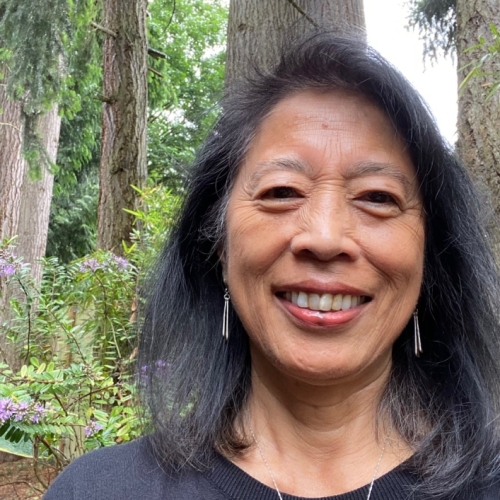Animal Behavior
Professor of Animal Behavior
Research Interests: My lab is interested in the neural basis of acoustic communication. We use fish as model systems to investigate ontogenetic and reproductive-state dependent changes in the auditory system. I am also interested in sound source localization and how fishes detect and locate underwater sound sources in both relatively simple and complex acoustic environments.
DEI Initiatives: My lab is committed to attracting, retaining, and graduating a diverse student body. We also support the need for organized action around diversity and are committed to creating and sustaining a welcoming climate where people of all backgrounds feel welcome.
Behavioral Neuroscience
Associate Teaching Professor
Research Interests: I study neural correlates of motivation for natural reward.
DEI Initiatives: My Psychology of Gender course fulfills a UW Diversity credit, but I strive to incorporate the principles of DEI in all of my courses. I use universal design principles in my materials and resources; I attempt to incorporate diverse voices in assigned readings and course materials; and I address diverse perspectives to the best of my abilities and available resources in all of my classes.
Professor of Behavioral Neuroscience
Research Interests: I conduct neural circuit analyses underlying memory, decision, and motivation.
DEI Initiatives: I support URM students in the lab via different mechanisms, the most current of which is through a Diversity Supplement to my NIH grant. In my undergrad classes, I conclude the topic of the neurobiology of bias and race. I am the PI of a 10 year NIH funded professional development program for URM early career (postdoc, assistant professor) neuroscientists, called BRAINS. About 150 URM neuroscientists are currently in our program. I'm on a DEI committee of the Association for Psychological Sciences. I'm on the DEI committee for the Graduate Program in Neuroscience, and I regularly serve on grant review panels related to the NIH Blueprint for Diversity in Neuroscience Research.
Clinical Psychology
Assistant Professor of Clinical (Adult) Psychology
Research Interests: I study neurobiological correlates of maladaptive social cognition (particularly self-focused attention) in anxiety and obsessive compulsive related disorders to inform personalized treatment prediction; role of neuropeptides (such as oxytocin) in the pathophysiology of psychiatric disorders to inform targets for intervention and novel therapeutic strategies.
DEI Initiatives: I am currently revamping the former Minority Mental Health course to address multicultural practice gaps within the clinical training program based largely on student feedback. I will be teaching this course in Spring 2021. I have also been leading a special interest group at ABCT focused on translating neurocognitive interventions and neuroscientific principles more broadly into actual clinics, which has involved efforts to engage community stakeholders, assess community needs/current beliefs about neuroscience integration, as well as providing training opportunities for translational neuroscience to underserved students in particular.
Assistant Professor of Clinical (Adult) Psychology
Research Interests: I study alcohol’s relationship to sexuality, sexual assault and sexual risk.
DEI Initiatives: I have extensively revised my Systems of Psychotherapy class syllabus consistent with the DEI syllabus review/revision initiative. I am also on the newly established Diversity Advisory Committee, which is tasked with monitoring and advising faculty search committees efforts to increase faculty diversity.
Associate Research Professor
Research Interests: My lab studies both how to improve social connection/relationships and how to decrease racism, with a focus on microaggressions and the psychological obstacles that get in the way of change.
DEI Initiatives: My lab studies microaggressions, improving the effectiveness of anti-racism training, bias in medical provider-patient relationships, and coping with racism. We study how to connect across differences including political and racial differences. I also do DEI training and consulting for UW Medicine, legal organizations, and academic groups.
Professor of Clinical (Adult) Psychology and Director of Clinical Training
Research Interests: I study health behavior research and interventions, with a focus on global and marginalized populations. The fundamental theme underlying most of my research is the influence of culture and social support on psychological well-being and physical health. I focus on oppressed and stigmatized populations (e.g., persons living with HIV/AIDS, racial/ethnic and sexual minorities). Conceptually, my work is grounded in a modified stress-coping paradigm incorporating factors specific to oppressed groups that conventional health-related theories often overlook.
DEI Initiatives: My labs underlying assumptions are grounded in anti-colonialism and recognize widespread systematic racism. Many of my students have been engaged in DEI-related research as well. I work with marginalized populations (e.g., persons living with HIV, LGBTQ+, Latinx, Indigenous) and the global south. The ultimate aim of my research is the delineation of culturally relevant models of adaptation that lead to practical, accessible, and generalization disease prevention and health promotion interventions.
Child Clinical Psychology
Professor of Clinical (Child) Psychology and Associate Chair for Graduate Studies
Research Interests: I study treatment effectiveness and implementation science research; mostly child and adolescent focused. I work in publicly-funded settings, community mental health in the U.S., and, globally, low and middle income countries.
DEI Initiatives: My research focuses on populations and settings that are publicly-funded and serve where most BIPOC youth receive care, both in the US (medicaid-funded settings, community mental health) and globally (low and middle income countries). We also study how to build in-country/in-organization expertise in treatments, with individuals from the country/culture or organization leading training, adaptations, and implementation of treatments. I use qualitative methods so that participants' voices come through in their own words and lead what we do. My lab has overhauled all of our undergrad and staff recruitment procedures to ensure greater inclusion of BIPOC students/hires in our lab. We have developed stronger mentoring, support, and training for our undergrads that clearly put our values around diversity and inclusion at the forefront and try to spell out the hidden and unwritten parts of research and steps that help students advance to graduate school and be successful. Part of this support is including flexibility in hours students are involved in the lab, professional development for all undergraduate volunteers, and paths for all undergrads to have CV building opportunities (posters, papers). I've also led/collaborated on a lot of DEI work as Associate Chair for Graduate Studies in the Department (e.g., using awards audit data to drive an overhaul of our graduate student merit awards and how awards are scored, financial transparency work for graduate students, support for first year students joining our Department during Covid-19).
Professor of Clinical (Child) Psychology
Research Interests: I study children’s vulnerable and resilient reponses to stress and adversity.
DEI Initiatives: My lab has focused on the effects of low income and adversity on children's development and psychopathology. This research is informed by systems that sustain inequity. In addition the outreach at the Center for Child and Family Well-being aims to share evidence-based mindfulness and cognitive-behavioral programs with community organizations that support racially and ethnically diverse families.
Professor of Clinical (Child) Psychology
Research Interests: I study promoting early access to specialized intervention for toddlers with ASD, through community training and outreach.
DEI Initiatives: My lab is committed to promoting diversity and inclusion, as reflected in our research focus (improving the lives of children with autism and their families), our research approach (providing training and outreach to providers working in underserved communities and with families from diverse ethnic and cultural backgrounds), and our research team (comprising UW students and research assistants with diverse lived experiences from around the globe). The core of my research involves developing and evaluating methods to promote healthcare equity for access to autism-specialized services. Toward that end, we work with families from medically underserved communities as well as their health care providers. We also aspire to increase the pipeline to STEM careers for UW students and research assistants with diverse backgrounds. Many of our former students and staff are now pursuing graduate training in psychology or other related fields.
Cognition and Perception
Professor of Cognition & Perception
Research Interests: I study blindness and visual processing.
DEI Initiatives: Blind individuals are probably the most discriminated group in the USA - 80% unemployment, people would rather have cancer than be blind, and blind individuals are often not treated as autonomous individuals. By studying how blind individuals make massive cognitive adaptations to be functional in a world designed for sighted people, I hope to emphasize that blindness requires societal accommodations so blind individuals can demonstrate their full potential.
Assistant Research Professor of Cognition & Perception and Quantitative Psychology
Research Interests: The Neuroinformatics R&D Group in the Psychology Department and eScience Institute conducts research on the biological basis of brain function using computational tools that we develop and maintain.
DEI Initiatives: Inclusion is among the stated core values of my research group. Much of the work that we do is done openly, in collaboration with a global community of practice that develops and maintains software tools and computational standards for reproducibility. This kind of work requires constant thinking about diversity, equity, and inclusion, to make sure that participants from different backgrounds and with different perspectives have the opportunity to contribute and take part in the work of the community. In addition to developing tools, we devote a significant effort to training and support of users and developers of computational tools (e.g., the NeuroHackademy summer school in neuroimaging and data science). These training efforts present an opportunity to address diversity equity and inclusion in the field, in that thoughtful recruitment of trainees, and a training program that emphasizes DEI can support members of groups that are under-represented in neuroscience, data science and the intersection of these fields.
Professor of Cognition & Perception
Research Interests: I study the neural processes underlying language, in particular language comprehension. My interests span both the processing of a person's native language, and also the acquisition of a non-native language later in life. The primary method used in the lab involves recording event-related brain potentials from the scalp while people comprehend written or spoken language.
DEI Initiatives: All typically developing children and all healthy adults learn and use a language. However, our research has identified robust individual differences that reflect diversity within and across different people. One goal of our research is to better understand this variability by identifying other variables that robustly predict it.
Social and Personality Psychology
Professor of Social & Personality Psychology
Research Interests: My lab investigates causes and consequences of gender and racial inequities in the U.S., and how to change cultures to remedy inequities.
DEI Initiatives: My research focuses on explaining and remedying social inequities. I also teach classes related to DEI (e.g., PEERs in engineering, core concepts in social psychology). My lab is involved in several outreach efforts, including student partnerships with community colleges, presenting at Women in Science conferences, and serving in leadership positions related to DEI (e.g., NCWIT social science advisory board, SISPP executive board).
Department Chair, Professor of Social & Personality Psychology
Research Interests: My lab explores self and social identity, particularly when the worth of one’s social identity (e.g., race, ethnicity, gender, sexual orientation, intersectional identities) is called into question, for example by stereotypes, discrimination, and structural systems. My research develops and extends theoretical perspectives on social stigma, legitimacy, identity, diversity, and sexual harassment, and connects social psychology with intellectual perspectives from related disciplines, including law, political science, and sociology. My approach highlights how theoretically-driven psychological science has important implications for social issues, and how real world events provide opportunities for advancing psychological science.
DEI Initiatives: My graduate teaching includes courses on social stigma, discrimination, and social identities. I mentor students and postdocs in research on these topics.
Assistant Professor of Social & Personality Psychology
Research Interests: My research, which lies at the intersection of social and health psychology, explores how cultural, social, and psychological factors shape the health and well-being of people from diverse backgrounds. My lab's research focuses on understanding the role that social psychological factors play in shaping the health and well-being of people from diverse backgrounds.
DEI Initiatives: I teach classes on topics related to DEI, including a graduate course on cultural psychology and an undergraduate seminar on the psychology of health disparities.
Associate Teaching Professor
Teaching Interests: I teach social psychology, which explores how social and cultural context shapes people's thoughts, feelings, and behavior.
DEI Initiatives: I am a mixed-race person with Chinese and Indonesian ancestry. I am always interested in mentoring and supporting people from underrepresented backgrounds.
Professor of Social & Personality and Quantitative Psychology
Research Interests: I seek to examine psychological processes within each person separately, and develop and refine research designs to make that possible.
DEI Initiatives: In a typical study in psychology, what is true for a minority of research participants is often drowned out by the majority. To address this problem, our quantitative idiography research design seeks to identify the psychological reality of those who are in the minority. This has implications not only for diversity within North America, but across the world. In addition to serving on the UW Psychology Diversity Steering Committee, I co-chair the Society of Personality and Social Psychology's International Committee to help make our science a science for all people. The committee's mission is to overcome our science's tendency to consider, without evidence, what is found in WEIRD cultures is true for all people. I gave a SPSP plenary talk on this topic and I'm an author of a paper addressing this issue. I also serve on the department's Diversity Advocacy Team.
Quantitative Psychology
Associate Professor of Quantitative Psychology
Research Interests: I study measurement and applied statistics. Measurement, design, and analysis choices have substantial impacts on our understanding of behavior at the individual and population levels (e.g., health disparities). Better treatment of information and variation within and between groups, for example, historically underserved groups, will help advance our science and ability to reduce harm and enhance lives.


















